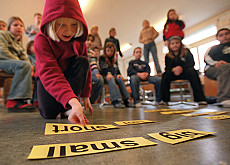
National languages get priority over English

Switzerland's House of Representatives has approved a new language law that forces schools to teach a second national language before English.
The Conference of Cantonal Education Directors has already criticised parliament’s decision, saying it goes against an agreement that allows cantons to decide how languages are taught.
The final vote on Thursday saw 87 members approve the legislation and 68 oppose it.
The rightwing People’s Party had demanded unsuccessfully that no debate take place, citing fears that the cantons would lose some of their sovereignty in educational matters if the law were accepted, or that it would increase government spending.
The biggest discussions centred on which languages should be taught to schoolchildren first. The centre-left Social Democrats said a second national language should have priority over English, but they were also backed by some members of the People’s Party who said that it was important for national cohesion.
Centre-right Christian Democrat Chiara Simoneschi-Cortesi warned it was necessary “to stop the invasion of English”.
The Social Democrat Christian Levrat, one of the initiators of the project, said it was time to send a clear signal to the cantons before they cut a second national language out of the school curriculum.
Softer approach
Part of the centre-right Radicals and most the Christian Democrats felt that the legislation needed to be softened, stating only that a student should have some skills in another national language as well as a foreign one by the end of compulsory schooling.
Christian Democrat Kathy Riklin pointed out that Zurich and most cantons in eastern Switzerland had already introduced English instead of French in second and third years in primary schools. She added that it was not possible to go back to the old system where French had priority.
The legislation sets out guidelines for the use of the four national languages – German, French, Italian and Romansh – favours a multilingual approach and attempts to preserve the interests of Italian and Romansh, which are spoken only by about seven per cent of the population.
If implemented, the law would cost up to SFr17 million ($13.7 million) per year, with subsidies for example for student exchanges or press agencies serving all four language regions.
The government had presented a project for the legislation in 2001 before pulling it off the table in 2004 because of financial concerns.

More
Multilingualism
Wrong strategy
The cantonal education ministers complained after the parliament vote that the decision threatened the compromise they had put together and approved a week ago.
The agreement states that the cantons could decide alone which was the second language, either English or a national one, to be taught in their schools.
In a statement, the conference said that years of talks had shown that no consensus could be reached between the country’s different regions. It added that leaving the decision in the hands of each canton was not just the best strategy, but also the only one.
The other parliamentary chamber, the Senate, will now have to approve the legislation before it can be implemented.
swissinfo with agencies
One nation, four national languages:
German (63.7% of the population)
French (20.4%)
Italian (6.5%)
Romansh (0.5%).
Nine per cent of the population say their main language is not one of these four.
The Federal Constitution lays down the right to education and the obligation to attend school, but it is the cantons that are responsible for schooling.
This means there are currently 26 different education systems in Switzerland, although there have been calls to harmonise the Swiss educational system.
Most pupils start school at the age of seven, after one or two years of nursery school. They usually stay in school for nine years before going on to higher education or training.
Overall, cantons are permitted to take their own independent decisions when it comes to the structure of their education systems, syllabuses and the dates of school holidays.
The conference of cantonal education ministers ensures contact and harmony between the cantons.

In compliance with the JTI standards
More: SWI swissinfo.ch certified by the Journalism Trust Initiative















![The four-metre-long painting "Sonntag der Bergbauern" [Sunday of the Mountain Farmers, 1923-24/26] had to be removed by a crane from the German Chancellery in Berlin for the exhibition in Bern.](https://www.swissinfo.ch/content/wp-content/uploads/sites/13/2025/12/01_Pressebild_KirchnerxKirchner.jpg?ver=a45b19f3)













You can find an overview of ongoing debates with our journalists here . Please join us!
If you want to start a conversation about a topic raised in this article or want to report factual errors, email us at english@swissinfo.ch.